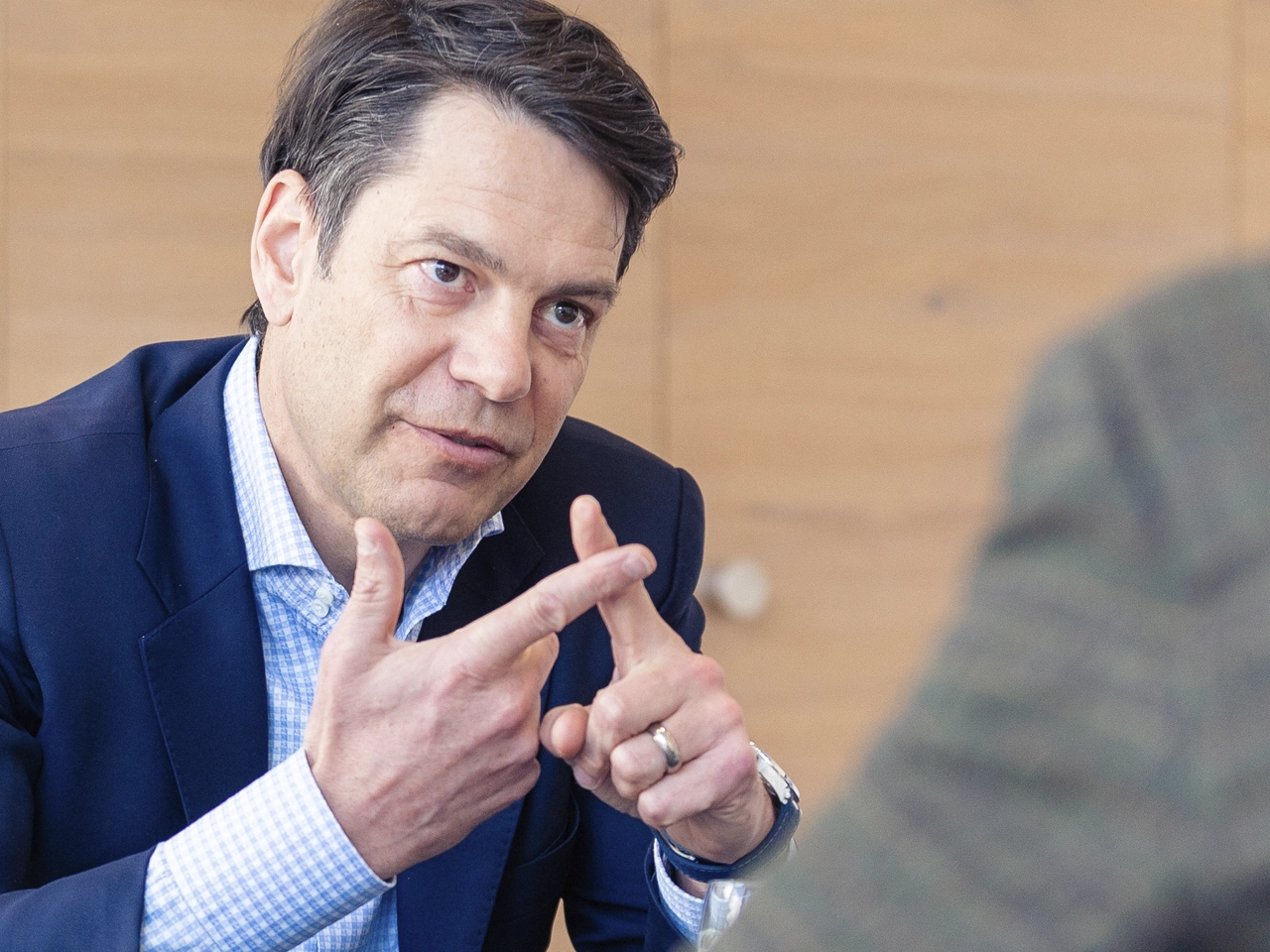Home > Company > Publications > Stefan Brupbacher
Where is Swiss industry heading? Threats and opportunities
Swiss industry deserves respect. On the basis of the solid foundation of its recognised strengths, it has managed to stay on course for success. However, it’s becoming increasingly clear that the threats to Switzerland’s industrial base are growing. These do not all originate from abroad: problems such as the impending collapse of energy supplies or Switzerland’s strained relationship with the EU are just as serious as the trend towards isolation in certain markets, the frosty relationship between the USA and China, or the effects of the war in Ukraine.
What’s in store for industrial companies in Switzerland? And how should they deal with it? Stefan Brupbacher, CEO of Swissmem, the association for Switzerland’s mechanical, electrical and metal industries, Daniel Bachofen, Managing Director of Bachofen AG, and Andreas Bachmann, Sales Manager of Bachofen AG, discuss the current situation, describe scenarios and send wake-up calls to politicians.
Daniel Bachofen: How do you assess the current situation of Switzerland’s industrial base?
Stefan Brupbacher: Switzerland is one of the few countries that hasn’t experienced any deindustrialisation in the last twenty years. The industrial companies in Switzerland have succeeded in increasing their value creation and productivity by 60%. They’re internationally oriented and competitive. Switzerland’s industrial base is basically in good shape.
Andreas Bachmann: Optimistic prospects for the current year, then?
SB: Of course, there are big question marks: How will the war in Ukraine develop? Can we expect cyber attacks? Will energy prices continue to rise? Will the trade war with China get worse? All of these factors can have significant implications for the economy.
DB: And then there’s inflation …
SB: Because it’s still too high, central banks will raise key interest rates until consumption and wages fall. The current economic environment is a tense one. Central banks are pushing for higher interest rates, while markets are saying rates won’t go up.
DB: Inflation, rising interest rates, the China problem and the energy crisis pose major problems for Germany, Europe’s largest economy. If industrial companies start to leave the country, it’s likely to become critical for us too.
SB: Around 25% of our industrial exports go to Germany. We’re very closely integrated. We are, in fact, worried about what’s happening in Germany.
AB: And what’s your advice to your members?
SB: Lesson 1 is to diversify your supply chains. And that’s what most companies are meanwhile doing. Lesson 2 is to embrace innovation trends and help shape them. That’s nothing new, either. Lesson 3 is to brace yourself for the effects of trade wars and distortion of competition due to government intervention. Lesson 4 is to stay on top of increasingly complex regulations.
DB: In a Swissmem survey of members’ biggest concerns, supply chain problems came out on top. Energy prices came second, and labour shortages third.
SB: That may have changed by now. The labour shortage is dramatic and is hurting companies. It’s frustrating when you can’t implement interesting projects because you can’t get enough staff. Making matters worse is the trend toward part-time work.
AB: What is your association doing to counteract the labour shortage?
SB: We’ve stepped up industry marketing in general and use social media and other channels, in particular to address young people looking for a career. In our campaigns, we show what’s cool about our industry, and also address our commitment to climate-friendly production.
DB: I see another major challenge for industry in Switzerland in the undermining tendencies against free trade, which are particularly dramatic for the export industry. The USA against China, the America First policy, a possible IRA* for Europe, and so on. How are you assisting your members when it comes to these sensitive issues?
SB: We offer, for example, webinars and seminars on new legislation in countries we export to, especially the USA. On a political level, we’re strongly committed to fighting protectionism, concluding as many free trade agreements as possible, and finding a solution with the EU.
DB: Will the trade war between the USA and China lead to industrial companies in Switzerland having to duplicate their portfolio, as it were, or to choose one market over the other?
SB: Ideally, they shouldn’t have to choose. But certain market-specific changes will be unavoidable for some companies. I’m thinking, for example, of machine tool manufacturers who, according to US regulations, will have to reduce the proportion of US components if they want to supply machinery to China.
AB: What should be done if the pressure to choose between America and China increases?
SB: Switzerland must a double-pronged strategy of making itself indispensable. The first aims to produce unique products that world markets can’t do without. That would be a kind of insurance policy.
AB: The second?
SB: We expect the Swiss government to develop diplomatic offensives and proposals, in the same way as Singapore currently does. Switzerland must position itself so that it makes other countries realise that they need us, and in return we let them get on with their business.
DB: The Europeans subsidise their industry and the US Americans are engaging in technological decoupling. This means they are obstructing the free market and jeopardising prosperity.
SB: That is unfortunately the case. That’s why it’s so important that we as an association convince the public how important exports and free trade are for prosperity, not just here but also in countries we export to, such as Brazil or Indonesia.
DB: How do you assess the prospects of the IRA* and the CHIPS Act** for the USA?
SB: Recent studies show that the IRA is leading to calls for subsidies. What the government does to protect businesses is paid for by consumers. Government interventions haven’t been a success for the US economy, unless you’re one of the companies that has been getting them.
DB: Subsidies definitely aren’t the right way forward. And I don’t think Swiss industry needs them.
SB: The industrial companies in Switzerland are performing outstandingly despite multiple crises. They consistently focus on the highest quality and precision. They vigorously promote innovation projects and act proactively and flexibly. Last but not least, and thanks above all to the dual education system, they have qualified and motivated employees who are aware of their responsibility for the results of their work.
AB: One topic of particular concern to the export industry in Switzerland is our relationship with the EU. What’s your association’s position on this?
SB: The only real solution can be to continue along the bilateral path. Anything else is either impossible or makes no sense. The Federal Council should finally conclude its exploratory talks and move forward quickly.
AB: The same applies to the issue of energy …
SB: What worries me most is that, according to the EU Commission, EU countries will only be allowed to supply 30% of electricity exports to countries like Switzerland from 2025 on. From then on, if Leibstadt fails in winter we’ll have a blackout. Time is running out, but politicians are dragging their heels. What makes it more difficult to clarify our relationship with the EU is that the EU dossier happens to be dominated by two aggressive trade unions.
DB: In energy policy, we have two problems: the threat of a de facto ban on the supply of electricity from Europe from 2025 and the insufficient level of domestic production.
SB: I see this as a typical failure of politics and government over the last 10 to 15 years. We’ve known for a long time that we urgently need more sustainably generated energy. However, we have an approval practice for production infrastructures that’s dictated by officialdom instead of common sense.
DB: Obstinacy instead of the ability to compromise …
SB: It really is incredible how many objections can be made to the construction of solar power plants or wind turbines. Protecting individual interests take priority over the common good. This is untenable.
DB: Am I wrong, or has something been happening in politics recently?
SB: Probably only due to pressure from the headlines in the media, which raised the spectre of an energy shortage …
AB: … and now summer is coming.
SB: Summer’s just around the corner and, prosperous as we are, we think we’ve got nothing to fear. But if we carry on with this attitude, we’ll end up with blackouts. Electricity production has to grow now. It’s five minutes to midnight.
DB: Is an extension of the electricity agreement with the EU even possible at all without a solution to the bilateral agreements?
SB: The message from Brussels is as clear as day: no electricity agreement without an institutional agreement. It’s worth considering whether the problem of the EU’s 30% limit on power deliveries to Switzerland could be solved at the technical level, but for this, too, we need the goodwill of the EU. As a small country, we’re always at a disadvantage.
DB: Thermotronics expert Professor Lino Guzella says, “Build whatever you can”. What’s the right technology for generating carbon-neutral energy in Switzerland in the future?
SB: Intensive development is going on at the moment with various technologies. This is being done on the principle of technological openness and neutrality. This is the only way innovation is possible. The goal must be to find an optimum balance between security of supply, competitive prices and sustainable production.
AB: Nuclear energy must also remain an option.
SB: That’s right. But to do that, we first have to overturn the ban on the technology. However, nuclear power plants aren’t built in a day. At the moment, we have to focus on what can be implemented as soon as possible, in other words, on the rapid expansion of solar energy, wind energy and hydropower.
AB: Finally, what are your three wishes for Swiss politics, parliament and government?
SB: Wish number 1 is that politicians should finally recognise that Switzerland is blessed with a manufacturing industry that creates wealth and makes an extremely important contribution to solutions facing society worldwide. Wish number 2 is that they find solutions for unhindered access to foreign markets, in other words for a cooperative relationship with the EU and other countries that are attractive to Swiss exporters, and make sure Switzerland continues to be seen as a beacon of internationality. Wish number 3 is that they commit to the dual education system. We don’t need more and more academics, but as many well-trained, skilled professionals as possible.
The discussion took place on 22 February 2023 at the Bachofen AG headquarters in Uster.
* Inflation Reduction Act
** “Creating Helpful Incentives to Produce Semiconductors”, US federal law of August 9, 2022.
Stefan Brupbacher has headed the leading Swiss industry association Swissmem since 2019 and has represented the interests of Swiss industry in the European umbrella organisation of industrial companies Orgalim since 2020. He studied at the University of Zurich and graduated as a doctor of law. Previously, he studied European and international business law at Johns Hopkins University in Bologna and Washington DC, and at the University of St. Gallen. Stefan Brupbacher is a staunch liberal and advocate of a free market economy.


